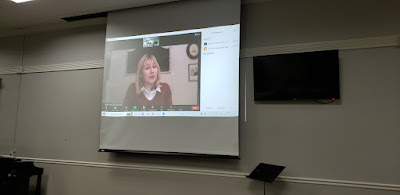Just a quick reminder. RootsTech 2024 begins Thursday, February 29 and concludes March 2, 2024. It's all FREE and ONLINE! Google RootsTech2024 to register or sign up on FamilySearch.
Tuesday, February 27, 2024
Monday, February 26, 2024
Arizona Genealogy Day 2024
February 24, 2024 was this year's Genealogy Day, sponsored jointly by the Arizona State Library and AZGAB (the Arizona Genealogy Advisory Board). It was unfortunate that the registration website indicated a few weeks ago that registration was full. Evidently there was a glitch in the process, as I received an email Friday about registering.
Topics for the day via Zoom included the following:
"More Than Just a Mark: Livestock Branding"
"Finding Your Family in Historical Newspapers"
"Weaving Cultural History into our Family History Writing"
"Strategies and Techniques: African American Slave Research"
"Mind Mapping: Your Genealogy Research Plan and Results"
All speakers were both interesting and informative. Watch for information regarding next year's event.
Friday, February 23, 2024
County Histories
County histories were created at different times in history, originally during the time of Grant's presidency to commemorate the country's centennial and to bring people together after the Civil War. Publishing dates included the 1880s, late 1890s and 1912-1920. You should also conduct searches for village and town histories at the time of their centennials.
Publishing companies in larger cities sent representatives into the countryside to interview (mainly) farmers. They were charged a fee to be in the book, another to have a photograph included and one more charge if they wished to purchase the history.
Residents were asked about their family history back to the original settler in the county. The biographies also included information about siblings and children. These histories are a wonderful resource, particularly in providing maiden names of the women in the family.
Search Internet Archive, FamilySearch books, USGenWeb, the FamilySearch Wiki or just Google "Online County Histories."
Saturday, February 17, 2024
February 13 Workshop
Maureen and Annie collaborated this week on the subject of naturalization. Annie began with an overview of the naturalization process, including examples of both declarations of intent and citizenship papers. It is helpful to use the census to determine whether an ancestor had become a citizen or had started the process. Both FamilySearch and Ancestry have some of the records.
Paying attention to the laws of the time is an important part of researching naturalization records.
Sunday, February 11, 2024
The Photo Angel
This week we had a special presentation via Zoom from Kate Kelley all the way from Massachusetts. She is known as the Photo Angel because of her genealogical project. She rescues labeled photographs from antique stores, researches the name and attempts to return them to a descendant.
Kate told us that she has been interested in family history since childhood and started her project after finding several photos unrelated to family in her collection. She uses Ancestry, MyHeritage and FindAGrave to hunt for similar names and photos.
Kate encourages other genealogists to join her project as a way to give back to the genealogy community. You can find more about The Photo Angel by searching for that title on Facebook.
Tuesday, February 6, 2024
Vista Grande Library Genealogy Class
"Cemeteries Are Not Just for the Dead" is the title of next week's Vista Grande genealogy class. Alisa will include care and cleaning of gravestones, FindAGrave, BillionGraves, obituaries and death certificates as part of her presentation.
Come to the Vista Grande Public Library next Tuesday, February 13, at 10 AM to hear all about this topic.
Friday, February 2, 2024
January 30 Workshop
This week we took a closer look at birth, marriage and death records with examples of the kind of information they include and where they can be found. Generally, the online records are in index form and the original record must be located at a county courthouse or state archive.
These records are regulated by individual states and the best place to learn about them is the FamilySearch Wiki. On a state or province page you can narrow your search to "vital records" and get specific year ranges that will make your research more efficient.
Don't forget to check delayed birth records for ancestors born late in the 1800s or early 1900s. Once social security laws were passed, people had to prove their date of birth to apply.
If you cannot locate a marriage record, think about Gretna Greens near your state. Couples could cross state lines to marry where the laws were less restrictive.
US GenWeb and Linkpendium should be checked for locating vital records as well as FamilySearch and Ancestry.












